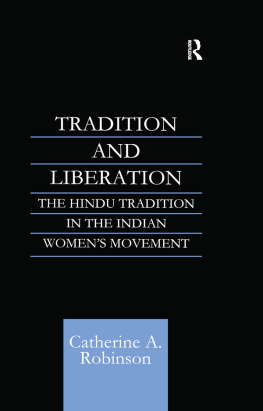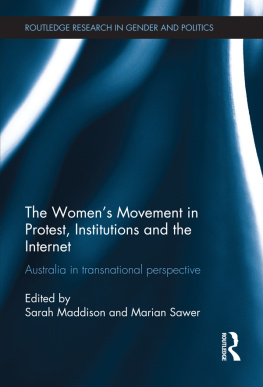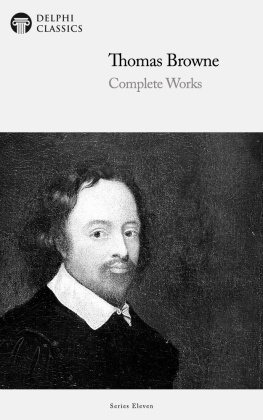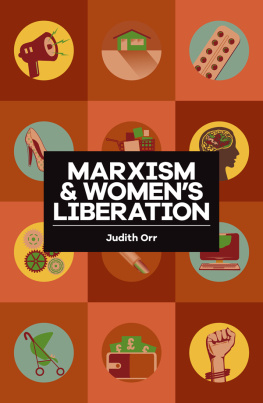
GENDER IN HISTORY
Series editors:
Lynn Abrams, Cordelia Beattie, Pam Sharpe and Penny Summerfield
The expansion of research into the history of women and gender since the 1970s has changed the face of history. Using the insights of feminist theory and of historians of women, gender historians have explored the configuration in the past of gender identities and relations between the sexes. They have also investigated the history of sexuality and family relations, and analysed ideas and ideals of masculinity and femininity. Yet gender history has not abandoned the original, inspirational project of womens history: to recover and reveal the lived experience of women in the past and the present.
The series Gender in History provides a forum for these developments. Its historical coverage extends from the medieval to the modern periods, and its geographical scope encompasses not only Europe and North America but all corners of the globe. The series aims to investigate the social and cultural constructions of gender in historical sources, as well as the gendering of historical discourse itself. It embraces both detailed case studies of specific regions or periods, and broader treatments of major themes. Gender in History titles are designed to meet the needs of both scholars and students working in this dynamic area of historical research.
The womens liberation movement in Scotland
OTHER RECENT BOOKS IN THE SERIES
Love, intimacy and power: marital relationships in Scotland, 16501850
Katie Barclay
(Winner of the 2012 Womens History Network Book Prize)
Modern women on trial: sexual transgression in the age of the flapper
Lucy Bland
Modern motherhood: women and family in England, c. 19452000
Angela Davis
Jewish women in Europe in the Middle Ages: a quiet revolution
Simha Goldin
The shadow of marriage: singleness in England, 191460
Katherine Holden
Women, dowries and agency: marriage in fifteenth-century Valencia
Dana Wessell Lightfoot
Women, travel and identity: Journeys by rail and sea, 18701940
Emma Robinson-Tomsett
Imagining Caribbean womanhood: race, nation and beauty contests, 192970
Rochelle Rowe
Infidel feminism: secularism, religion and womens emancipation, England 18301914
Laura Schwartz
Being boys: working-class masculinities and leisure
Melanie Tebbutt
Queen and country: Same-sex desire in the British Armed Forces, 193945
Emma Vickers
The perpetual fair: gender, disorder and urban amusement in eighteenth-century London
Anne Wohlcke
THE WOMENS LIBERATION MOVEMENT IN SCOTLAND
Sarah Browne
Manchester University Press
Manchester and New York
distributed in the USA exclusively by Palgrave Macmillan
Copyright Sarah Browne 2014
The right of Sarah Browne to be identified as the author of this work has been asserted by her in accordance with the Copyright, Designs and Patents Act 1988.
Published by Manchester University Press
Oxford Road, Manchester M13 9NR, UK
and Room 400, 175 Fifth Avenue, New York, NY 10010, USA
www.manchesteruniversitypress.co.uk
Distributed exclusively in the USA by Palgrave
175 Fifth Avenue, New York,
NY 10010, USA
Distributed exclusively in Canada by UBC Press
University of British Columbia, 2029 West Mall,
Vancouver, BC, Canada V 6 T 1 Z 2
British Library Cataloguing-in-Publication Data
A catalogue record for this book is available from the British Library
Library of Congress Cataloging-in-Publication Data applied for
ISBN 978 0 7190 8729 5 hardback
First published 2014
The publisher has no responsibility for the persistence or accuracy of URLs for any external or third-party internet websites referred to in this book, and does not guarantee that any content on such websites is, or will remain, accurate or appropriate.
Typeset in Minion with Scala Sans display by
Koinonia, Manchester
For my parents, Janice and Jervis
Contents
First and foremost, I want to thank those who agreed to be interviewed. I learnt a lot from each interviewee completing this research certainly raised my consciousness. The interviews will be deposited in Glasgow Womens Library for future researchers to use. I would also like to thank Aileen Christianson, Nadine Harrison, Mary Henderson, Elspeth McLean, Paula Jennings, Fiona Mackay, Sin Reynolds and Norman Watson for giving me access to source material. This book began its life as a PhD thesis under the supervision of Callum Brown and Perry Willson at the University of Dundee. This was an incredibly supportive environment in which to explore my ideas. In particular I would like to thank Callum Brown and Jim Tomlinson for their willingness to discuss my ideas and for providing me with opportunities to teach, and I would also like to thank Billy Kenefick for sparking my interest in womens history. I will always be very grateful to the Carnegie Trust for the Universities of Scotland for funding my PhD studies as without this funding I would not have been able to complete doctoral research. Moreover, I am indebted to Esther Breitenbach for providing me with source material and contact information, reading a draft and, more importantly, for continually offering me encouragement and support. Of course, all errors remain my own.
While converting my thesis into a book I was employed as a Teaching Associate in History at the University of Nottingham. I am grateful to the students who asked interesting and informed questions and to Elizabeth Harvey who provided me with support during periods of doubt and encouraged me to believe that my research was making a valuable contribution. I have also appreciated the support of the postgraduate community at the University of Nottingham, especially my conversations with members of the Gender Studies reading group and my MA module on Gender and Sexuality. The staff at Manchester University Press, especially Emma Brennan, have also been incredibly helpful and supportive and their guidance has been appreciated throughout this process.
To piece together the story of the womens liberation movement in Scotland I travelled the length and breadth of Britain, from the University of Aberdeen archives to the Womens Library in London. I feel very lucky to have been given the opportunity to conduct research in the Womens Library before its move to the LSE. While it is great that the collection remains open, the closure of the Womens Library building is such a sad loss. Archive and library visits were made easier because of the helpful staff, and Carole McCallum at Glasgow Caledonian University archives deserves a special mention for being an enormous help. Thanks also to the Trustees of the National Library of Scotland for granting permission to use material from their collections, as well as Esther Breitenbach and Bill McLoughlin (formerly of D. C. Thomson) for granting permission for the use of images. I have attempted to locate all copyright holders of material used in this book but please contact me to let me know if material appears without copyright permission, as I would appreciate being able to acknowledge this in future publications.









